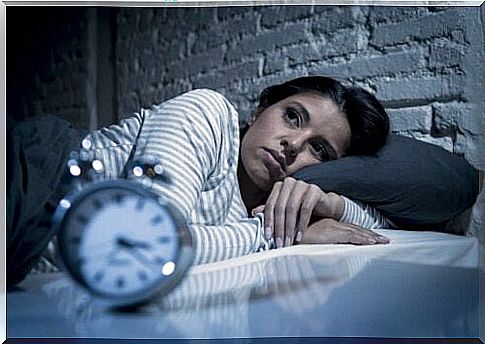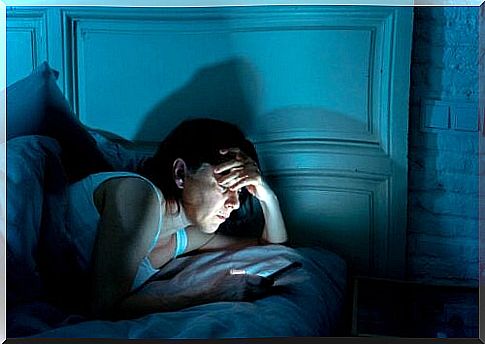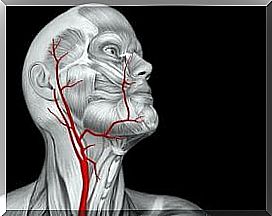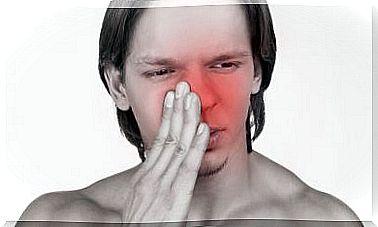Nocturnal Anxiety: Causes And Keys To Overcome It

Nocturnal anxiety is the feeling of tension and restlessness during the night, specifically before going to sleep. It occurs in anticipation of a threat or danger, which usually happens thanks to the invasion of negative thoughts at this time of day.
This response comprises a series of unpleasant physiological and cognitive symptoms, which have an adaptive purpose. However, if they are intensified or prolonged over time, they can cause serious problems for the person’s physical and mental health.
What is nocturnal anxiety?
Nocturnal anxiety is an unpleasant emotional state of tension, agitation, and restlessness. It occurs when anticipating a possible danger or threat and manifests itself through a series of physiological, cognitive and behavioral reactions. In this particular case, it happens at night.
In this way, anxiety has an adaptive and survival function. It is, then, a defense mechanism to deal with the threats of life. However, there are times when this does not facilitate a better adaptation, quite the contrary.
In these cases, the reaction arises in response to false alarms, that is, to possible threats that are not, or when the danger tends to be overestimated. Thus, when we are faced with an anxiety that appears at night disproportionately to the situation or extends over time, we speak of a pathological response .
Pathological anxiety blocks adequate responses to coping with daily life, generates somatic discomfort, worsens the person’s performance and, in general, requires professional help to solve the problem. Daily life also ends up being affected by the difficulties in falling asleep.

Also read: Physical pain and anxiety, what is the relationship?
Nocturnal Anxiety Symptoms
Nocturnal anxiety is characterized by the manifestation of a series of somatic and cognitive symptoms at night, just before sleep. Not everyone experiences the same thing with the same intensity, as this depends a lot on the constitution of each one.
Among the most common signs are the following:
- Elevated heart rate : there are heart palpitations that are accompanied by a feeling of suffocation and tightness in the chest region.
- Sweating : profuse, cold, unrelated to ambient temperature.
- Abdominal discomfort : sometimes with nausea and vomiting.
- Derealization : it is a feeling of unreality or depersonalization with the feeling of being separate from oneself.
- Extreme fears : of losing control or dying.
Causes of nocturnal anxiety
Anxiety at night can occur from several causes, which differ among people who suffer from it. An important step in alleviating it is to identify the problem behind these manifestations and try to resolve it. The most common reasons are as follows:
- Everyday stressors : interpersonal, work or financial problems are factors that trigger anxiety attacks. In addition, it is common for these situations to invade the person’s mind in the form of negative thoughts right before sleep, making it impossible to rest.
- Traumatic events : the experience of catastrophic experiences, such as natural disasters, rapes, torture or kidnappings, among others, cause serious damage to the mental structure, which are associated with severe anxiety symptoms. At night, when going to bed, it is common for a person to relive these traumatic events.
- Biological factors : genetics play an important role in the appearance of anxiety manifestations. There are even people who are more predisposed than others, mainly by inheritance.
- Distorted thoughts : Anxiety is presented as an overvaluation of threats and an undervaluation of personal potentials. The person can get carried away by these thoughts during sleep, which triggers the activation of anxious responses.
Keys to Overcome Night Anxiety
If the manifestations of anxiety at night are intense and occur most of the time, it is better for the person to seek professional assistance. It can be a serious anxiety disorder, the most effective treatment for which is psychotherapy and, in some cases, medication. On the other hand, a person with nocturnal anxiety can perform a series of activities that help to calm him down.
Anti-stress activities
Physical activity helps the body to release tension and therefore feel more relaxed. If the exercises are performed two hours before bedtime, the person will be tired, making it easier to fall asleep without any problems.
Also, meditation and yoga are options that teach you to focus on the current moment. Body stretches also help release tension.
Muscle relaxation techniques and deep breathing exercises are other alternatives. This prevents tension in the body and hyperventilation, manifestations of anxiety attacks.
routines
Establishing a bedtime, that is, going to bed at the same time, will condition the body to prepare for that time. However, we should avoid using the bedroom for work or study. This will negatively relate the place of rest and sleep to stressful activities.
Likewise, one should avoid the consumption of stimulant substances, such as alcohol and caffeine, before bed. These products promote anxiety states due to their action on the nervous system.

Before bed, avoid negative thoughts
At night, just before bed, we are more susceptible to being invaded by negative thoughts. This is one of the times of the day when we find the mind more vague. As such, it is common to feel anxious.
However, if anxiety manifestations increase in quantity and intensity, the effects can be detrimental to health. Therefore, it is important to recognize the existence of a problem and seek the necessary and appropriate tools to resolve the situation.









